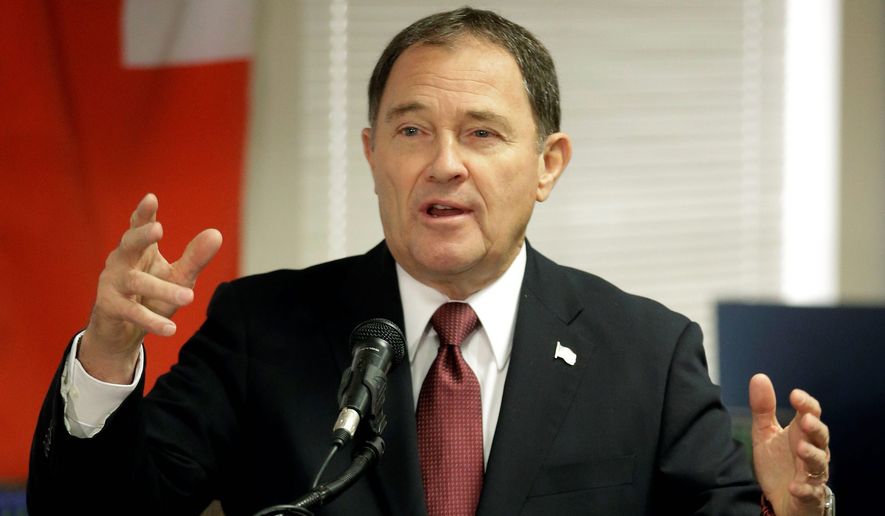Even as states wrestle with whether to expand their Medicaid programs under Obamacare, they’re already grappling with the looming 2017 date when the federal government begins to cut its support, which will force states to have to make tricky budget decisions.
It was always part of the deal — the federal government would pony up 100 percent of the cost of expanding Medicaid, but only for the first few years. In 2017, the federal share would drop to 95 percent, and slide to 90 percent in 2020. That 10 percent amounts to tens of millions of dollars even for small states, and runs much larger for big states.
“It’s not like we have $78 million sitting on the shelf,” said Utah state Rep. Jim Dunnigan, a Republican who’s skeptical of expansion in his state, where Gov. Gary Herbert is touting it as a way of extending insurance to 58,000 people in the “coverage gap” — a situation in which people make too much for Medicaid but too little for tax credits on the Obamacare exchanges.
Mr. Herbert and other Republican governors looking to expand are now trying to find innovative ways to offset the costs the states will eventually have to bear, in order to convince skeptical state legislatures.
Some governors envision imposing fees on hospitals that will benefit from the expansion, while others are eyeing cigarette taxes.
But in their push for expansion, the governors never mention Obamacare by name, even as they take advantage of dollars the law offers for states that agree to offer Medicaid coverage to those making up to 138 percent of the federal poverty level.
PHOTOS: Republican governors push to expand Medicaid
“Certainly, leveraging the federal dollars plays a role,” said Alexia Poe, spokeswoman for Tennessee Gov. Bill Haslam, the latest Republican governor to unveil a GOP-friendly version of Medicaid expansion.
Mr. Haslam this month pitched his plan, Insure Tennessee, as a two-year pilot program. He said it won’t tax Tennessee’s budget because hospitals have agreed to pick up any additional costs. The program will be terminated if commitments from the hospitals or federal government are not met.
The state’s hospitals are rooting for expansion, saying the boost in Medicaid-covered patients will reduce the costs they bear right now for uncompensated care.
Indiana Gov. Mike Pence, a Republican rumored to be considering a 2016 presidential run, rolled out his own expansion plan in May, saying it would be funded through cigarette-tax revenue and an assessment on hospitals that takes effect in 2017.
Governors need to devise the funding schemes because their legislatures don’t believe that the expansion will pay for itself, said Timothy Jost, a law professor at Washington and Lee University who closely tracks the health care law.
“And in some states it might not, but it will go a long ways toward paying for itself in all states,” he said.
While some governors are pitching their expansions as tests, analysts predicted it will be hard for them to rescind the programs once they’re in operation, even when the federal government share of costs dips to 90 percent.
“Ninety cents on the dollar is still a very high match,” said Robin Rudowitz, a Medicaid expert at the Kaiser Family Foundation, a nonpartisan health policy organization.
GOP governors insist their approaches adhere to conservative principles. Many of the plans use funds to buy private-market health plans, or make newly eligible residents seek work or pay for a share of their coverage.
The Health and Human Services Department has to sign off on their alternatives, and agency secretary Sylvia Mathews Burwell has signaled she will work with red states on the issue.
Arkansas, Iowa, Michigan and Pennsylvania have secured waivers, and all but Arkansas sought them with Republican governors in charge. Mr. Pence’s waiver for Indiana is pending.
Republican Gov. Matt Mead of Wyoming and Alaska’s new governor, Republican-turned-independent Bill Walker, have taken steps to expand coverage, while GOP governors in Alabama and North Carolina have dropped hints they would be open to some form of private market-oriented expansion.
But legislators in many of those states are still skeptical of the price tag.
Mr. Dunnigan, who co-chairs a health task force in Utah, said he is not convinced the economic benefits of expansion or revenue ideas on the table, such as a tax on e-cigarettes, can cover Utah’s tab in 2020.
“It’s hard to capture those dollars and identify them and say, ’OK, those are the dollars I have for Medicaid expansion,’” he said.
His task force recommended more limited coverage plans for the medically frail that rely on state dollars. While the options do not fully leverage federal funding under Obamacare, he said it would be a shame if federal terms change in three years and the state had to take coverage away.
“There’s still a lot of uncertainty,” he said.
• Tom Howell Jr. can be reached at thowell@washingtontimes.com.




Please read our comment policy before commenting.